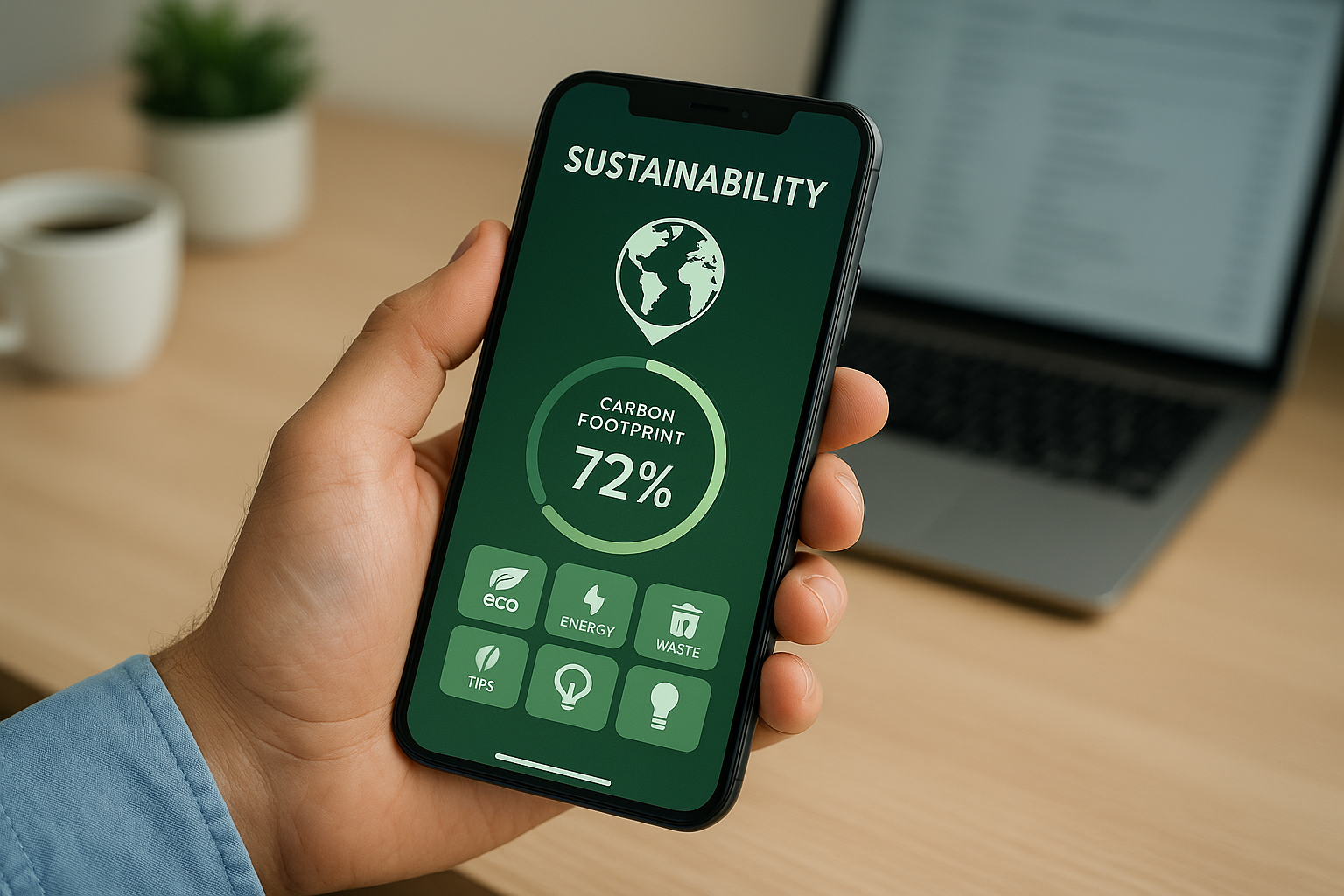How Mobile Apps Are Driving Sustainability and Carbon Footprint Reduction

Strong 8k brings an ultra-HD IPTV experience to your living room and your pocket.
In an era where climate change and environmental preservation have become urgent global concerns, technology is playing a pivotal role in driving sustainability. Mobile apps, once primarily associated with entertainment, shopping, and social networking, are now powerful tools for promoting eco-friendly practices and reducing our carbon footprint.
From helping individuals track their energy consumption to enabling businesses to optimize supply chains, mobile apps are transforming how we interact with the environment. Let’s explore how these digital solutions are leading the charge in sustainability.
1. Raising Environmental Awareness
The first step towards a greener planet is awareness. Mobile apps have made environmental education accessible, engaging, and interactive.
- Eco-awareness apps like Oroeco and JouleBug allow users to learn about their daily environmental impact in real-time.
- Gamified learning experiences make it easy for users to understand complex sustainability issues through quizzes, challenges, and rewards.
- Social sharing features encourage communities to adopt green habits collectively, turning individual actions into larger movements.
By making environmental information easy to digest, these apps empower people to make informed decisions that reduce their ecological footprint.
2. Encouraging Sustainable Lifestyles
Sustainability starts with small, everyday choices. Many mobile apps are designed to help users adopt greener habits effortlessly.
- Transportation apps like Moovit and Transit promote the use of public transport, cycling, or carpooling instead of individual vehicles, reducing carbon emissions.
- Zero-waste lifestyle apps like Too Good To Go and OLIO help reduce food waste by connecting users with surplus meals from restaurants or groceries.
- Second-hand and upcycling apps like ThredUp and Vinted encourage sustainable fashion by extending the lifecycle of clothing and reducing textile waste.
By making sustainability convenient and cost-effective, these apps motivate more users to make eco-friendly choices.
3. Optimizing Energy Consumption
Energy consumption is one of the biggest contributors to carbon emissions. Mobile apps are increasingly integrated with smart home technologies to monitor and optimize energy use.
- Smart thermostat apps like Nest and EcoBee allow users to remotely control heating and cooling, saving energy.
- Home energy monitoring apps provide detailed insights into how much electricity appliances consume, helping users identify energy hogs.
- Renewable energy apps help households transition to solar or wind power by tracking usage, savings, and environmental benefits.
For businesses, apps that monitor industrial energy consumption and carbon emissions are becoming critical for achieving sustainability goals.
4. Supporting Eco-Friendly Mobility
Transportation accounts for a large share of greenhouse gas emissions. Mobile apps are revolutionizing how we move from one place to another:
- Ride-sharing apps like Uber Green and Lyft allow users to choose electric or hybrid vehicles, reducing emissions per trip.
- EV charging apps like PlugShare make it easier to locate charging stations, encouraging electric vehicle adoption.
- Bike-sharing and micro-mobility apps like Lime and Bird offer low-carbon transportation alternatives for short trips.
These solutions not only reduce traffic congestion but also contribute to cleaner urban environments.
Read More:- AI in Renewable Energy Driving Efficiency and Sustainable Solutions
5. Enabling Paperless Transactions
Mobile apps are drastically reducing paper consumption, which helps preserve forests and lowers CO₂ emissions from paper production.
- Digital wallets and banking apps eliminate the need for printed receipts, statements, and checks.
- eTicketing apps for events, travel, and public transport reduce the demand for paper tickets.
- Document scanning and e-signature apps like DocuSign and Adobe Scan make contracts and official paperwork 100% digital.
By promoting paperless ecosystems, mobile apps are helping both individuals and businesses reduce waste significantly.
6. Promoting Sustainable Shopping
Consumer choices have a huge impact on sustainability. Mobile apps now help users shop more consciously:
- Eco-friendly product discovery apps like Good On You rate brands based on sustainability practices.
- Carbon footprint calculators integrated into shopping apps show users the environmental impact of their purchases.
- Grocery delivery apps increasingly offer sustainable packaging options and highlight local, organic products.
Some apps even allow users to offset their purchase-related emissions by contributing to carbon-neutral projects.
7. Empowering Businesses with Green Supply Chains
It’s not just individuals benefiting—mobile apps are helping companies become greener too.
- Supply chain monitoring apps track carbon emissions from sourcing, manufacturing, and logistics.
- Fleet management apps help optimize routes, saving fuel and reducing emissions.
- Sustainability reporting apps allow businesses to measure, analyze, and share their environmental performance with stakeholders.
These digital tools make it easier for organizations to align with global sustainability standards and reduce operational waste.
8. Facilitating Carbon Offsetting
While reducing emissions is crucial, offsetting unavoidable emissions is equally important. Many mobile apps now allow users to directly support carbon offset programs.
- Apps like Klima and Pachama let users calculate their personal carbon footprint and fund reforestation or renewable energy projects.
- Travel apps like Skyscanner integrate carbon offset options directly at checkout, encouraging eco-conscious flying.
This democratizes climate action, making it simple for anyone to contribute to global sustainability efforts.
9. Data-Driven Sustainability
One of the most powerful impacts of mobile apps is their ability to collect and analyze real-time data.
- For individuals, personalized sustainability insights help track progress, like how much CO₂ they’ve saved by using public transport or reducing energy consumption.
- For cities, apps contribute to smart city initiatives, providing data on traffic, pollution, and resource use to optimize urban planning.
This data-driven approach ensures sustainability initiatives are more targeted, effective, and scalable.
The Future: AI, IoT & Blockchain for Sustainability
- The next wave of mobile apps will be even more impactful thanks to emerging technologies:
- AI-powered apps will predict and recommend personalized eco-friendly choices based on user behavior.
- IoT integration will allow apps to connect seamlessly with smart devices, creating fully automated energy-saving ecosystems.
- Blockchain-based apps will improve transparency in carbon credits, sustainable supply chains, and recycling initiatives.
These advancements will make sustainability more accessible, measurable, and reliable for everyone.
Challenges Ahead
While mobile apps are driving positive change, they also face some challenges:
- Digital divide: Not everyone has access to smartphones or reliable internet, limiting the reach of sustainability apps.
- Greenwashing risks: Some apps may exaggerate their environmental impact without real accountability.
- Energy footprint of technology: Data centers and mobile networks still consume significant energy, so the tech industry must also prioritize green infrastructure.
Addressing these challenges will be crucial for maximizing the impact of mobile apps on sustainability.
Read More:- AI in Sports: The New Generation of Opportunities
Conclusion: A Digital Path to a Greener Planet
Mobile apps are proving that technology can be a powerful ally in the fight against climate change. By raising awareness, encouraging sustainable habits, optimizing energy use, and enabling carbon offsetting, these digital tools empower individuals and businesses to make a tangible difference.
As emerging technologies like AI, IoT, and blockchain evolve, the potential for mobile apps to drive sustainability and reduce our carbon footprint will only grow stronger.
Note: IndiBlogHub features both user-submitted and editorial content. We do not verify third-party contributions. Read our Disclaimer and Privacy Policyfor details.







